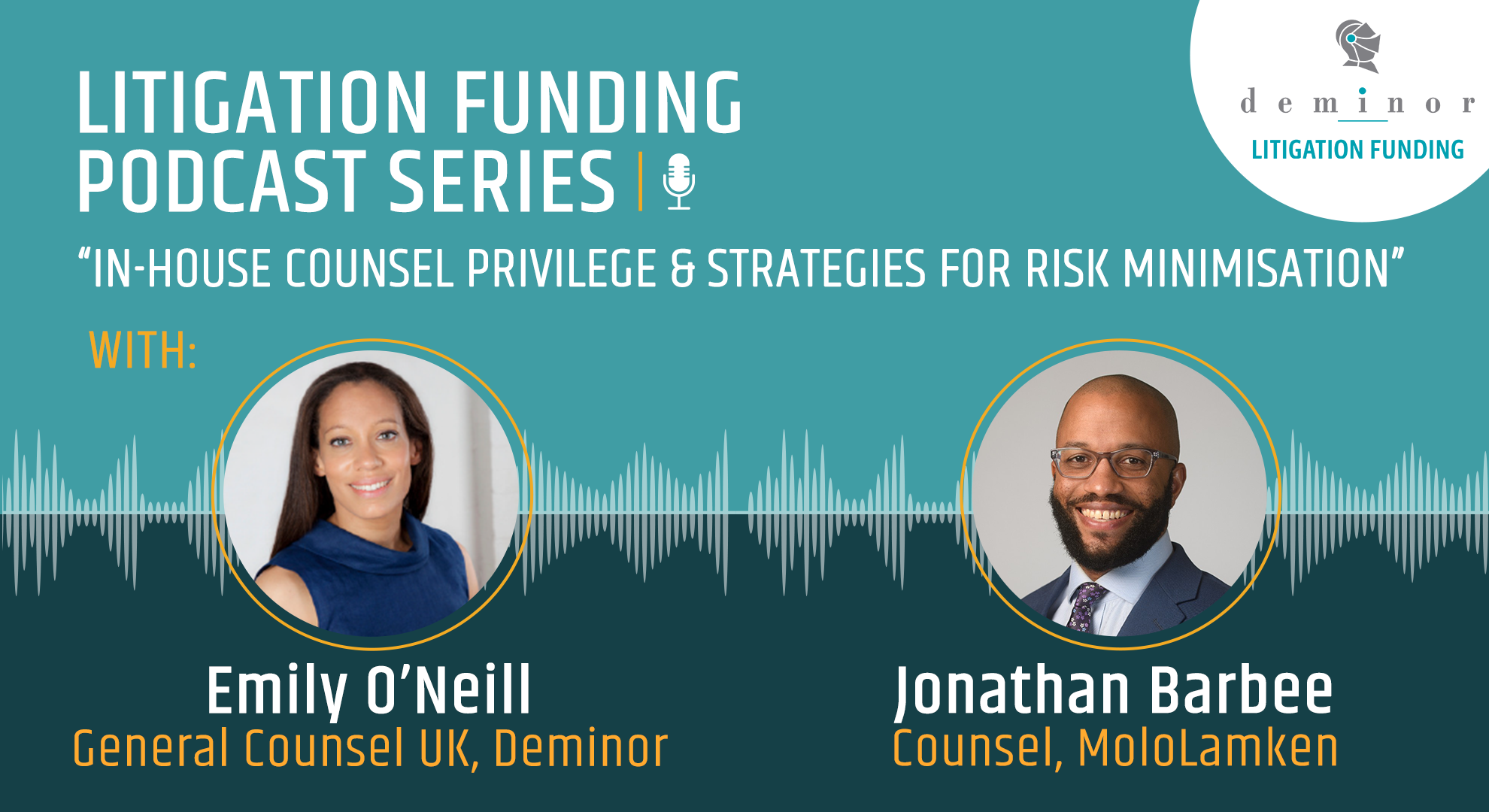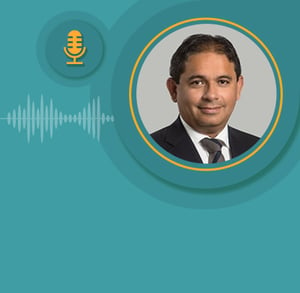In this podcast series, Emily O'Neill General Counsel UK for Deminor Litigation Funding, undertakes interviews with global professionals to discuss different aspects of litigation and litigation funding.
Deminor welcomes you to join this conversation as we summarise the key elements of the discussions between Emily O'Neill and these experts, as captured in the podcast transcripts below.

Podcast Preface:
Deminor General Counsel UK, Emily O'Neill (EON), speaks with Jonathan Barbee, Counsel at MoloLamken, a law firm focused exclusively on representing clients in complex disputes.
In this interview, Emily and Jonathan take an in-depth look at client-attorney privilege from a US perspective, with a focus on how privilege can be maintained by in-house counsel and what steps in-house counsel can take to minimise risk.
Podcast Transcript:
EON - Today I'm joined on the Deminor podcast series by Jonathan Barbee, and we are going to talk about how privilege can be maintained by in-house counsel and how in-house counsel can minimise risk.
What is the general position on privilege? Is the advice that in-house counsel give to their business privileged?
JB - Generally speaking, I would say that most lawyers and courts in the US believe that whenever an in-house counsel is giving advice to their company or to employees at their company, then that advice is presumed to be privileged. Now, if it's challenged, then there might be some reasons why certain advice isn't privileged. But for the most part, people understand that the reason why you have in-house counsel at a company is because they're going to be providing legal advice of some sort to the business.
Obviously, you may be having a conversation about a business issue, but the reason why you're likely to have a lawyer in the room is because there's some sort of legal issue there. And whenever the lawyer speaks, the lawyer is generally providing some sort of legal advice. But of course, there are exceptions to any rule. One thing that lawyers here are becoming more aware of is the fact that courts are paying more attention to the fact that in-house counsel wear two hats - they wear their legal hat and their business hat. And so, whenever a discovery dispute concerning privilege arises in a US court, you have to be ready to deal with that issue.
I think that's been further complicated recently because more companies have lawyers in non-traditional legal positions. So decades ago you would have your in-house counsel, and employees would only go to that person with discrete, specific legal issues. Now, you might have somebody who's a Vice President at a company, and yes, they're in a legal role, but they're also in some sort of business strategy role too, so they're straddling those two responsibilities.
So that's another thing that we have to be aware of, which is that in-house counsel need to be very conscientious about the specific role that they're playing at their companies.
EON - Do you think that job title or function makes a difference in that assessment? So if, for example, the legal counsel is not employed within the legal department, does that automatically mean that the advice they're giving to the company is commercial rather than legal? So if they are a VP, or have a non-legal title, does that automatically flag that their advice may not be privileged? Or is it about the subject matter they're opining on?
JB - It's really going to be the subject matter. Legally speaking, it shouldn't matter what their title is or which department they technically belong to. The way that will come up in a litigation, if you ever have to litigate a privilege issue, is that that's going to shape the narrative and the reasoning behind why an in-house counsel's advice was or wasn't protected by the privilege.
So if they're just sitting in, say, a product management team and providing advice directly to a team of engineers every day, then it's easier for the lawyers on the other side of a litigation to make it seem like that person isn't really engaging in providing legal advice all the time, because they're on this product management team, and most of the time they're just talking about the business issues with developing a product.
EON - That's interesting. It seems to be a similar position to Europe. I spoke to Colin Passmore a couple of weeks ago, who is an expert on privilege in the UK, and his opinion was that in the UK, the lawyer has to be employed within the legal team to be able to say that what they're doing within the company could be privileged. So they need to be a lawyer working as a lawyer, whereas I think in-house counsel have worked quite hard over the last few years to become more business partners within organisations.
So even if you are within the legal team, I think that there's still a role where you may have parts of your advice being legal and parts of it being a bit more commercial. If that happens within the same email chain, for example, how is that dealt with by the US courts?
JB - That's a really excellent point, Emily, and it brings up some of the trickier issues that I've faced in litigating privilege issues here in the US.
Some in-house lawyers can have these hybrid roles, and sometimes what you also see is somebody who's in a general counsel position, being elevated to become the CEO of a company.
In that situation, they may still be acting in their former capacity as a general counsel sometimes, but clearly, they're not just in that legal function anymore. And what happens in that situation, going to the email communications, the reason why that's tricky is because sometimes you'll have an email communication that has a blend of both legal advice and say, business advice.

It's really hard to say how that would be dealt with here in a US court because it will partially depend on the case law that's developed around privilege issues in a particular district court or court of appeals, and it will also depend partially on each judge's individual views of those issues.
As we all know, when you're dealing with a potential privilege issue, everything is nuanced and very unique. So, it may depend on the in-house lawyer's role, it may depend on who was cc'd on the email, it may depend on the purpose of the conversation. All those things can factor in.
The other thing that's considered when it comes to email chains is whether you can really parse apart the legal advice from the business advice. So, for instance, there may be a situation where you have an agenda for a meeting, and some of the items on the agenda relate to legal advice. Is this strategy appropriate under a certain statute or regulation? And then other parts of the agenda have nothing to do with legal advice. It may just be scheduling a meeting, or it may just be providing an update on revenue or something of that sort.
In that situation, you can actually break apart the legal advice from the business advice. Then if you get into a situation where you're litigating the issue and the non-privileged information has to be produced, then there’s a way to redact the legal advice portions of an agenda or document, while still producing the non-legal portions of that communication.
But it gets tricky, because sometimes you may have legal advice embedded in an email or some other document, and it's not clear that it’s legal advice. Then you could end up in some sort of fight about that, and unfortunately, sometimes you may end up having to produce the entire document.
I'm sure we'll get to this later on, but I think that's why in-house counsel need to be very conscientious and cautious about how they're setting forth legal advice and communications. If there's going to be any doubt about whether that legal advice will be understood as legal advice or business advice, then it may make more sense to just put it in a separate communication or document.
EON - Yeah, good advice, Jonathan. Problems can arise when you've given advice and then people on the email chain start to discuss that advice and how it can apply in a commercial context, then suddenly you have this spiralling, out of control communication chain.
You've mentioned the agenda and part one, part two, so legal, non-legal, and how to partition out advice.
What are the other practical steps that in-house counsel can take to ensure they maintain privilege in their own advice? And then we'll come on to talk about advice that's being received from outside counsel.
JB - There are a few things that the in-house counsel can do to ensure that the legal advice they're providing is protected and maintains its privilege, especially if it ends up in litigation. As I mentioned, US courts are very aware that in-house counsel wear two hats. So in-house counsel just need to be aware of that and ensure that they're communicating to their audience which hat they're wearing. Yes, I'm giving you legal advice right now, or, no, I'm not giving you legal advice right now, we're discussing a business issue. And whether communications are verbal or written, make it clear when you're transitioning in between the legal and the business side of things.
I think it would behove in-house counsel to label their communications as privileged or legal advice. Even if it's something that's being communicated verbally at a meeting, there’s no harm in saying, ‘Hi team, I'm about to provide you with some legal advice about this particular compliance issue’, so that if it ever comes up in litigation, even if one of the meeting attendees is opposed, they can say, ‘I can't share with you what was discussed during that meeting because the lawyer told me at the beginning that it was privileged.’
So that's an extra precaution that in-house counsel can take. The other important consideration is for in-house counsel to think about how sensitive a particular legal issue or communication is. If it's just a routine piece of advice, then maybe you won't need to put as many protections in place.
However, if it's something that's very sensitive, such as whether a company is infringing on a patent or potentially engaging in some sort of act that will incur liability, then that's all the more reason to put additional protections in place, which can include labelling the conversation as privileged, making it clear that you're wearing your legal hat, limiting the audience, and making sure that the legal advice isn't disseminated too widely, because as you mentioned earlier, Emily, you can have issues with that, even if the dissemination of that advice shouldn't break the privilege. Again, if this comes up in litigation, it can just be harder to prove that the privilege was maintained.
For instance, I was thinking about a scenario where you have an in-house patent counsel giving advice to one employee about whether they do or don't infringe a patent, and then there's a second conversation where that employee talks to another employee and says that it's okay to copy the competitor's product.
In that situation, in court, you could argue that the first employee was conveying legal advice to the second employee just as if the in-house lawyer had talked to that second employee. But it just won't look good in the record when that comes out, and then that can cause issues.
There are a couple of other things that in-house counsel should consider, too. In the US, when it comes to privilege issues, you're always worried about whether the privileged communication will be challenged in litigation. If it isn't challenged, then you really don't have anything to worry about.
But another thing that in-house counsel should think about is the likelihood that the advice will become part of discovery in a litigation. Again, if it's a routine, everyday issue, that's probably not going to be litigated. But if you're talking about the prospect of engaging in actual litigation, and there's a good chance that an issue will be litigated, then in-house counsel should think about whether they would care if a particular piece of legal advice is deemed not to be privileged by a court, and they have to produce it in a litigation. It may be that they actually don't really care about some communications that are technically legal advice.
So for example, ‘yes, we're going to keep producing this product because we believe that we're complying with all these regulations’ – if that comes out in litigation, that's not harmful, as that's something that a business person would say. But if it comes down to issues of whether there's patent infringement or not, obviously you wouldn't want that to be disclosed.
EON - That's really helpful. In-house counsel are used to assessing different risks to the business, so the risk of their own advice being disclosed is something that they should be able to look at. What is the risk that there is going to be some sort of issue in court which will require disclosure? That's sometimes difficult when you're talking to people in non-common law jurisdictions. Here in continental Europe, there's no real disclosure, so privilege doesn't have the same impact as it does in the UK or in the US.
One thing we have in the UK is different types of privilege. We have legal advice privilege, which is quite narrow, but we also have litigation privilege. So, if litigation is contemplated, then the communications around the litigation from the lawyer are all going to be privileged. Do you have a similar kind of differentiation for when legal proceedings are contemplated in the US, or does the narrower kind of legal advice privilege apply in those situations as well?
JB - We have both types of privilege here in the US. So, the legal privilege that you're talking about is what we refer to as the attorney-client privilege, which also takes some other forms, such as the common interest privilege, which I'm sure we'll talk about shortly.
Then the second bucket of privilege falls under the work product doctrine, as we call it here in the US. So that's a privilege and a protection that covers communications and work product that's being prepared for litigation, with the understanding that if you're faced with a litigation, certain employees may be preparing documents for that litigation without a lawyer present or monitoring the activity. Practically speaking, you need to be able to have that type of communication and work product protected.

EON - You mentioned common interest privilege. As a funder, we're a third party, and in order to make our risk assessment as to whether to invest in a case, there's certain information that we need to receive about the case. Some of that could be information from in-house counsel or from an outside law firm.
In the US, how do companies safeguard information when sharing with third parties like funders?
JB - That really depends on the situation and the parties involved. I think that the safest rule to follow is to just not share your own legal advice with third parties unless there's a good reason to do so, and unless you have a special relationship with that third party, that could lead to protection from the common interest privilege.
So here in the US, generally speaking, for the common interest privilege to apply, you need to have a common legal interest with that third party. And sometimes courts can be slightly divided over the line between when the common interest privilege applies and when it doesn't.
So, for instance, it may be that your company and its joint venture, which is a separate company, have a shared business interest in starting this joint venture and dealing with all the legal issues inherent in that joint venture. Generally speaking, in that situation, the parties would assume that the common interest privilege does apply there, even though the common interest is grounded in a business partnership. Like I mentioned, there are definitely legal issues bound up in that business relationship.
But if that relationship and those shared interests are challenged in a litigation, it could be that some courts find that the shared business interest doesn't extend to a legal interest.
The other thing that parties have to be careful about, is the question of whether the common interest privilege applies to their communications or not, which can change over the course of their relationship. At the beginning of the relationship, it may be harder to argue that the common interest privilege applies, because at the beginning of the relationship, the parties don't necessarily have that shared interest. They're still deciding what that shared interest is going to be. And some would say that their interests are at odds because they're evaluating each other, negotiating over the terms of their relationship, and it's not until later on, once they've established the shared business interest, and the shared legal interest, that the common interest privilege applies more securely.
When it comes to litigation finance and funding, I think there’s the same dynamic in terms of how the common interest privilege would apply, say, during the due diligence process, where the parties are still scoping each other out and looking at the terms of their agreement, versus once a deal has been signed and you're actually in a relationship with somebody.
I think it's good to be aware of the distinctions between those different phases of relationships.

EON - That's really helpful. Let's turn our attention now to incoming advice to a company. When in-house counsel instructs a law firm to provide advice to their company, and then the in-house counsel then needs to implement that advice within the company, what's the best practice in terms of sharing the advice from outside counsel within the organisation?
How does in-house counsel maintain privilege in advice that's been secured from an external counsel?
JB - In that situation, where in-house counsel receives legal advice from outside counsel, you have a natural buffer because when that legal advice is conveyed by the in-house counsel to employees in the company, most US courts would view that as the same as the in-house counsel coming up with that legal advice on its own, without input from outside counsel. I don't know that there's a big distinction between those two scenarios.
So I think the same cautions for in-house counsel would apply, which is to make sure that you're careful about how broadly the legal advice is disseminated, to apply the necessary disclaimers or labels, to ensure that people know that it's legal advice, and to make sure that it doesn't get outside of the company to a third party. Because in that situation, even if it's a slip-up, then it could be argued that that slip-up broke the privilege. So you want to be careful about that.
Then, as we talked about earlier, especially when it comes to email, it can be easy to lose track of the legal advice, or the legal advice can seem to morph into business advice so that at the end of this long chain of communication, something that is technically derived from the legal advice just doesn't look like the legal advice anymore. And it's really hard to connect that final communication all the way back to the legal advice that was received from outside counsel.
So I think it's good for in-house counsel to just be very conscientious, because again, at the end of the day, you're really thinking about how these issues would play out in litigation, and in the US, as you mentioned, Emily, we have to deal with a lot of document discovery, and you can end up in a lot of fights trying to prove that email number 20 actually did come from that original email from outside counsel.
EON - It's difficult sometimes to manage internal communication, and as you've said, making sure that people are clear as to what they can and can't do with information, and trying to shut down the spiralling email chains is helpful.
If you’re employed within a group of companies as an in-house counsel, and you're not just advising your employer company, but also other group companies, such as subsidiaries who are not the same corporate entity, but who are in the same group, is there any kind of difference in the position on privilege?
Also, if that entity is in the UK, for example, so you have US counsel sitting at group level in the US providing advice to a UK entity, is privilege still going to cover their advice? Or because the US lawyer is not qualified in the UK, will there be a bit of a gap there when it comes to companies sharing legal advice with their subsidiaries?
JB - Generally speaking, we see the attorney-client privilege applying throughout an organisation, including the parent company and its subsidiaries. Generally speaking, when privilege issues come up in US litigation, parties aren't fighting about whether there is communication between two subs or between a parent and a subsidiary.
That being said, I think that sharing legal advice between a parent and a subsidiary can lead to some tricky privilege situations in certain scenarios, because it could be that at some point a subsidiary's interests become adverse to a parent's interests.
So you could have a situation when it comes to bankruptcy, or where a subsidiary is in the process of being acquired by another company. Obviously, when the subsidiary is still part of the original parent company, it's safe to assume that the privilege would apply to legal advice shared between the parent and the subsidiary. But obviously, once that subsidiary is acquired fully by the second parent company, then that subsidiary no longer has that shared legal interest with the original parent company. There’s a grey area in the middle of the transfer for the subsidiary from the first parent to the second parent, so you could have some issues about when the privilege no longer protects the communications between the subsidiary and its original parent. In-house counsel should just be aware of those types of situations.
In terms of the geographic location question, about whether the subsidiary is in a different country than the parent company, and whether, say, a US lawyer is providing advice to a foreign subsidiary, generally speaking, I haven't seen those issues come up in litigation.
Whether I'm providing legal advice to a client here or in Europe, the privilege should protect those communications equally, at least when it comes to litigating and proving those issues in US courts, because it wouldn't be fair if my legal advice was protected when my client's here, but then if my client gets transferred to the European office of the same company, I can no longer talk to them about the same legal issues.
So I haven't really seen that type of distinction about geography or location come up. But it’s a valid point that privilege rules are different in different jurisdictions and so obviously you want to be aware of that. Just because a communication is protected here doesn't necessarily mean that it will always be respected across the world.
EON - I think that's right. Being an in-house counsel is really difficult sometimes, because you're qualified in a specific jurisdiction, but you're advising your business more broadly, and taking a view on how you need to present your advice is sometimes difficult.
Thank you, Jonathan, our conversation has been really useful. I've taken a few key tips away. So firstly, assess the risk. If it's probably not going to end up in litigation, it's less of a risk. Keep control of your communications and think about whether you're giving legal advice or commercial advice, and make sure you keep the two separate. So if there is a dispute, it's much easier for those who have to review the documents to separate out the privileged advice from the general commercial advice from a particular individual.
Litigation Funding Podcast Series - Next Steps and Further Information:
Thanks for joining Deminor's Litigation Funding Podcast Series as we dive deep into core topics in funding litigation.
Keep an eye out for our upcoming conversations as Deminor General Counsel UK, Emily O'Neill, speaks with several more experts to get their insights into different aspects of litigation funding.
If you would like to connect with either Emily or Jonathan on LinkedIn, please click on the links below:
Emily O'Neill – Deminor General Counsel UK and Global IP lead
Jonathan Barbee – Counsel at MoloLamken
***
Further Reading:
- https://www.deminor.com/en/case-studies/co-funder-proposes-sharing-of-litigation-funding-risk-to-leverage-deminors-in-house-due-diligence-capability
- https://www.deminor.com/en/case-studies/financing-assertion-of-patents-protecting-manufacturing-processes
- https://www.deminor.com/en/case-studies/telecoms-patent-assertion-multi-jurisdictional-campaigns
- https://www.deminor.com/en/case-studies/canadian-innovative-start-up-preparing-for-a-david-v-goliath-litigation-funding-battle
- https://www.deminor.com/en/case-studies/whats-the-risk-assessing-the-risk-of-counter-assertion-by-the-defendant-in-patent-litigation
- https://www.deminor.com/en/case-studies/overstepping-the-mark-litigation-funding-trade-mark-infringement
- https://www.deminor.com/en/case-studies/lights-camera-action-recovering-damages-for-infringement-of-rights-in-a-short-film
- https://www.deminor.com/en/case-studies/recovering-damages-for-stolen-software-through-litigation-funding
- https://www.deminor.com/en/case-studies/funding-in-the-pharma-sector-/-investing-in-a-case-where-litigation-is-already-ongoing









